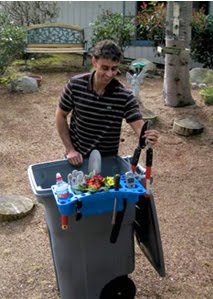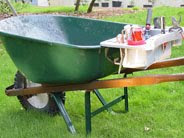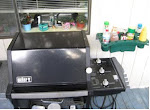Currently we discuss below:
Herbal Throat Remedy - might surprise you!
Black Spot on Roses - yuck, get it off!
Compatible Planting - my favorite
 |
| Mr. Garden Guy |
A. Yep! A very common herb, Thyme, can be used as a tea with honey to soothe a sore throat and scratchy cough. Awwww, hope you feel better soon.
Q. Hey, Mr. Garden Caddy Guy: What can I do about black spot on roses? - Kelly, California
A. To answer your question I'm going to quote some great advice from the big guys at the National Gardening Association. I think they have a thorough answer.
"There are several organic ways to control black spot. Most of them rely on regular monitoring and upkeep. None of them are difficult, and can be accomplished while you\'re admiring your roses. Plant roses in full sun. If you give your roses a spot where they receive a full six to eight hours of sun per day, you\'ll not only have plants that grow more robustly, but also plants that are more able to resist black spot. Black spot loves moisture, and, in shade, water evaporates much more slowly. In full sun, evaporation happens more quickly, which not only helps prevent black spot, but other fungal diseases as well. Plant roses in an area with good air circulation. This accomplishes the same thing as planting in full sun: moisture evaporates more quickly. In addition, with plenty of air circulation, hopefully breezes will blow any newly-germinated black spot spores away from your roses. In an area with poor air circulation, the spores have nowhere to go but back onto your plant and the surrounding soil. Water correctly. Try to avoid overhead irrigation, which wets the foliage. It\'s more efficient to water at ground level anyway; you lose less water to evaporation. Also, avoid watering late in the day. Water evaporates much slower in cooler evening and nighttime temperatures. Remove leaves that show signs of infection. As soon as you see black spot on your rose foliage, remove any infected leaves. Throw these leaves away. Don\'t put them in your compost pile. If you check your roses regularly, and remove infected foliage immediately, you\'ll have a good chance of keeping black spot under control and keep it from infecting other parts of the plant. Keep a clean garden. Pick up and throw away any fallen rose foliage regularly. Especially in late winter, rake up the area around your roses, dispose of any debris, and give the entire area a good three inch deep layer of mulch. If you do this before new foliage begins to emerge, it\'s fairly unlikely that you\'ll have any major issues with black spot. Choose resistant cultivars. If you\'ve had persistent problems with black spot, be sure to make sure that any new roses you add to your garden are resistant. Your local nursery will be able to provide you with suggestions. If you discover symptoms of black spot, dust with sulfur powder. Sulfur will not kill the fungus spores, but it will prevent a new generation from germinating. Or, spray with a solution of 1 tsp. baking soda mixed in 1 qt. warm water in the early morning hours. Spray roses with a dormant oil or Bordeaux mixture when plants are dormant (usually in winter)."
Enjoy your beautiful roses, Kelly!
Hey, Mr. Garden Caddy Guy:
Q. What exactly is "compatible planting"?
Alex, California
A. Companion/compatible planting is based on the idea that certain plants can benefit others when planted near each other. Scientific studies of companion planting have confirmed that some combinations have benefits unique to those combinations. Many gardeners have seen how well it works to mate certain plants for their mutual benefit. Some vegetables will yield up to twice as much when planted with companion plants.
Here is a great link to companion charts so you can plan what to plant together. CHARTS. Our thanks to gardenguides.com
The next step is to plant flowers that repel insects along with your vegetables. Here is a link to flowers that protect your vegetable garden: CLICK HERE Thank you to eHowHome.
Hope this helped.
Hey, Mr. Garden Caddy Guy is brought to you by GardenToolCaddy.com .
Please check out the greatest garden invention to come along in a long time. You'll be glad you did!
Only $19.95
Watch the video to see Mr. Garden Caddy Guy show you how it works:


+(Small).jpg)






.jpg)


.jpg)

1 comment:
This is great. I luuuuuv the video. (He's so cute!)
Post a Comment